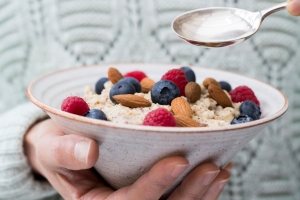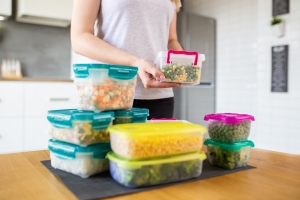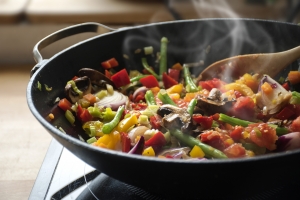General Eating Habits to Support our Gut Health
1. Mindful eating – Remove any distractions whilst eating – put your phone away, close down your computer and focus entirely on the food in front of you. This helps our digestive system to register we are eating and will in turn help to ensure we secrete our stomach acid and digestive enzymes to help break down our food properly so we can absorb all the important nutrients. If we mindlessly eat our meals, not only may we overeat, but we may not be breaking down and digesting our food properly which can lead to undigested food causing problems like gas production and bloating further down our digestive tract.
2. Chewing – Try chewing each mouthful for 20-30 chews. Although simple, this tip can make a huge difference. Chewing not only mechanically breaks down our food, it also enables enzymes in our saliva to be mixed with the food to help break it down. Chewing also helps signal the stomach and pancreas that food is coming so they release acid and enzymes respectively to further break down our food so it is ready to enter our small intestine where nutrients are absorbed.
BREAKFAST
1. Include fruit and/or vegetables with breakfast – These help to increase our fibre intake which helps support our digestive health and helps to keep us full until our next meal. They also contain polyphenols (compounds that are found naturally in plants and give them their vibrant colour) which have been shown to have many beneficial effects including promoting the diversity of our microbiome which is important for good digestive and overall health.
 2. Try Oats – Oats can be a great start to our day as they contain beta-glucan, a soluble fibre which helps keep our digestion moving and support our overall health. For the porridge lovers out there, simply adding some berries and nuts, seeds or nut butter to our existing oat-based breakfast not only adds nutrients, fibre and healthy fats but it can help to support our energy throughout the morning too. During the spring and summer months bircher museli or overnight oats can be a great alternative to porridge and are a quick grab and go as they are assembled the night before.
2. Try Oats – Oats can be a great start to our day as they contain beta-glucan, a soluble fibre which helps keep our digestion moving and support our overall health. For the porridge lovers out there, simply adding some berries and nuts, seeds or nut butter to our existing oat-based breakfast not only adds nutrients, fibre and healthy fats but it can help to support our energy throughout the morning too. During the spring and summer months bircher museli or overnight oats can be a great alternative to porridge and are a quick grab and go as they are assembled the night before.
3. Switch it up – I always encourage my clients to experiment with different breakfasts to see what suits them best, for example, some of us feel better having a more savoury breakfast. Switching things up and having different plants (fruits, vegetables, wholegrains, nuts and seeds) helps to promote and support a diverse microbiome.
LUNCH
1. Double up – Making double the amount of our supper the night before and bringing the leftovers in for lunch the next day can be the most time efficient way of ensuring we are getting in the nutrients we need to support our gut health. We should make sure we have at least 2 portions of vegetables with it too.

2. Batch cook – roast a big batch of vegetables (onions, peppers, courgettes, sweet potatoes, carrots, etc) on a Sunday or Monday (or any other day of the week you have time) and store in an airtight container in the fridge to use for lunches during the week. Add these to some cooked quinoa, brown rice, beans, pulses, or lentils (use ready cooked sachets/tins from the supermarket if you don’t have time to cook them at home), and have alongside some cooked meat or fish (batch cook this at home or buy ready cooked from the supermarket).
3. Sometimes we are unable to bring lunch with us, but making healthier choices in the shops is easy. Focus on building a balanced plate with shop bought ready cooked/made food; Ready-cooked protein (salmon fillet, chicken, tinned tuna, prawns, egg, cooked meat) with shop-bought salad. Beans, lentils, quinoa, roasted peppers, olives, marinated mushrooms, grilled aubergine all make great additions too.
SUPPER
I know the last thing many of us want to do when we get home from work is cook, but cooking a nutritious meal from scratch need not take a long time. There are so many dishes that are quick and easy to make but that are also tasty, nutritious and will help support our gut health. Here are some for inspiration;
Stir-fry with lots of different coloured vegetables. Add some strips of chicken, turkey, prawns or tofu. Flavour with fresh ginger and garlic, or just olive oil and lemon juice. Sprinkle on sesame seeds or cashew nuts before serving with brown rice (ready cooked in sachets if no time to boil from scratch).
1. Red lentil pasta, prawns and lots of sautéed mixed vegetables (onions, garlic, peppers, courgette etc.) in a tomato or pesto sauce. Stir through and wilt spinach just before serving or serve with side salad.
 2. Grilled/baked lean meat or fish on a bed of quinoa or brown rice, with steamed or roasted vegetables and a dressing of fresh lemon juice, extra virgin olive oil and black pepper.
2. Grilled/baked lean meat or fish on a bed of quinoa or brown rice, with steamed or roasted vegetables and a dressing of fresh lemon juice, extra virgin olive oil and black pepper.
3. Thai green chicken or chickpea curry made with a green curry paste (supermarket) & coconut milk, baby corn, mange tout and carrot strips. Serve with rice noodles or brown rice.
4. Smoked salmon, eggs, spinach and tomatoes/mushrooms on vegetable fritters (grated carrot/parsnip/potato/celeriac) or wholemeal toast.
Feeling constantly bloated and tired? Frustrated with your digestive problems not being fully understood or investigated? Feeling scared and helpless, wondering how you are going to cope living your life with your disruptive IBS symptoms for the rest of your life? Wish you could do more to help your IBS or IBD?
I currently have a limited number of spaces for nutritional coaching available. This can be done from anywhere in world via online video call.
For Biomed subscribers only I am giving 10% off my consultation packages if you purchase one before the end of July2019. If you are not sure what to do or want to work out if I am the right person for you I am more than happy to offer you a free 20 minute enquiry call to discuss your health and nutrition goals and how we can work together to achieve them.
Contact Details
Instagram: @clemmiemacphersonnutrition
Email: clemmie@nalmclinic.com
Website: www.nalmclinic.com
About Clemmie Oliver



Leave a Comment: